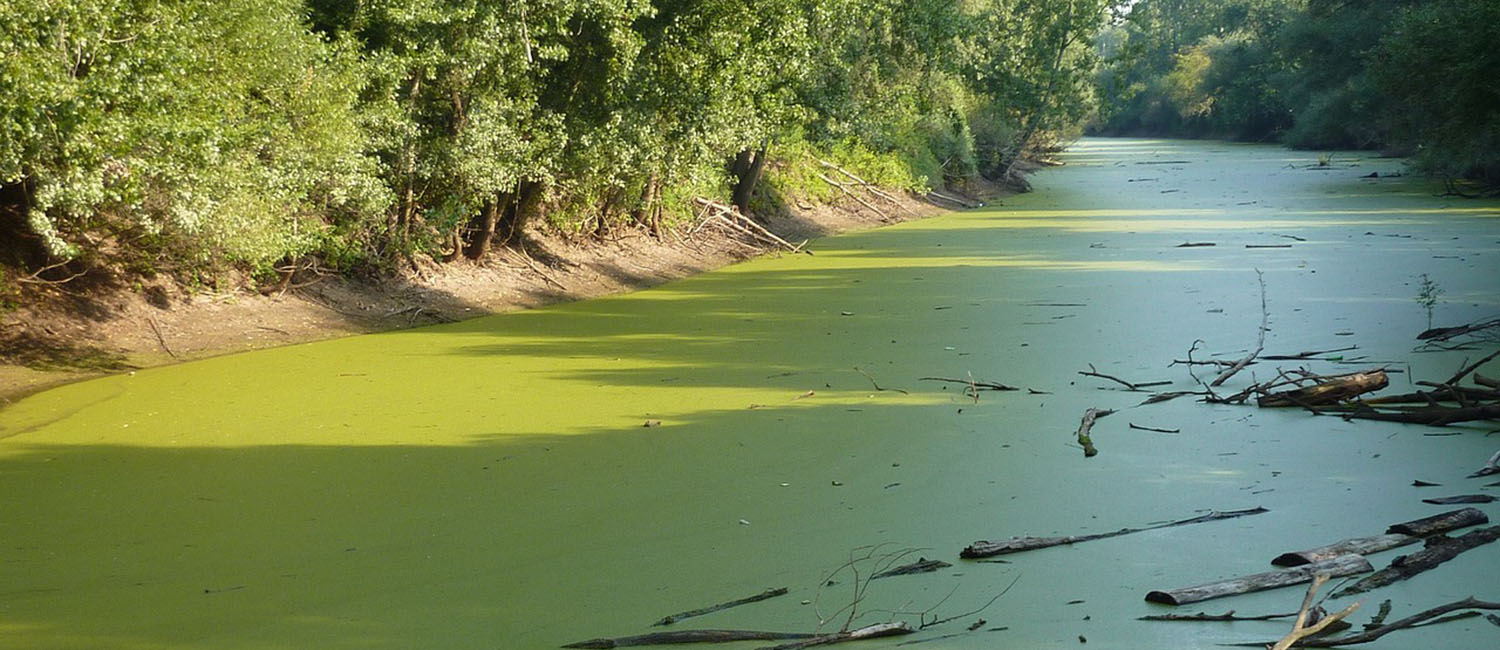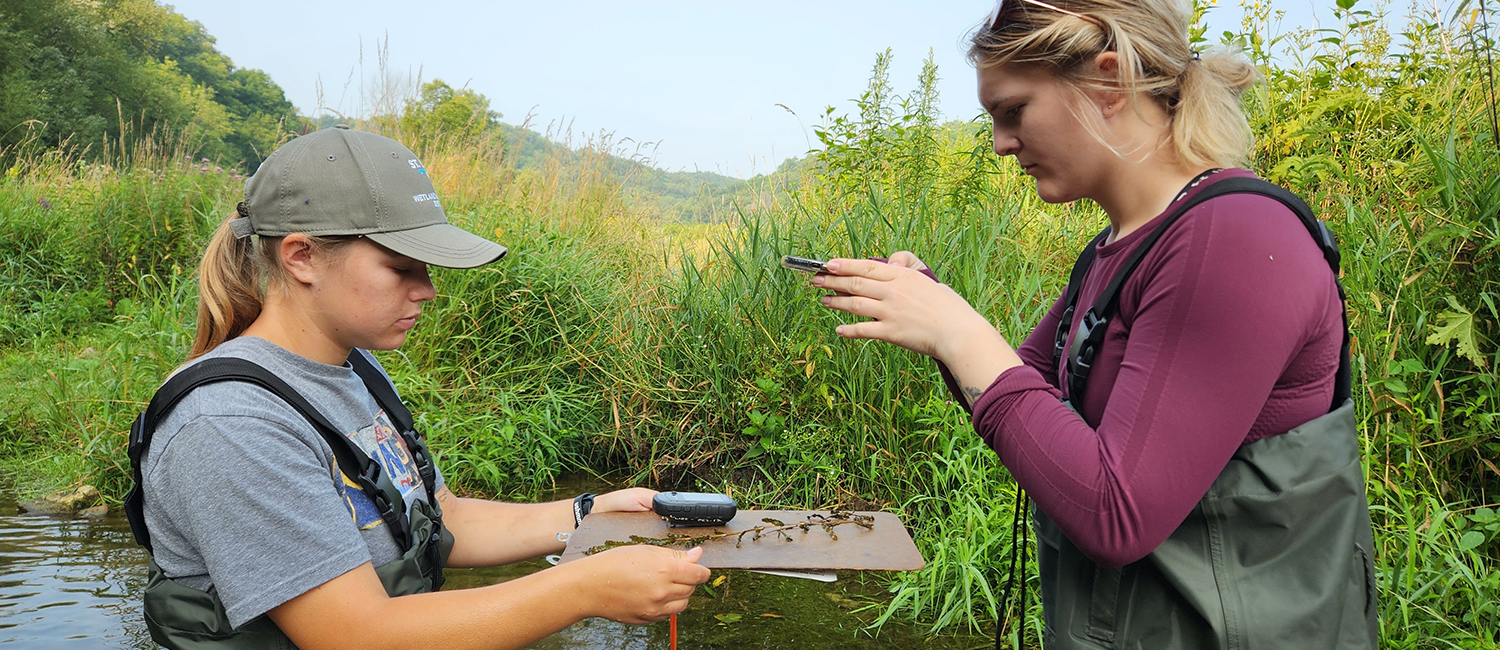Author: Heidi Jeter
Findings from Freshwater Collaborative Grant Help UW-GB Researchers Secure $750,000 in USDA Funding
When Michael Holly, an assistant professor at UW-Green Bay, began evaluating the use of natural and industrial by-products for their phosphorus sorption potential, he had no idea where the project would lead.
A $10,000 grant from the Freshwater Collaborative in 2020 to hire an undergraduate researcher for his lab helped kick things off. Since receiving the initial funding, Holly has hired multiple students, and he’s incorporated the research into UW-Green Bay’s environmental science capstone courses to provide students with research experience and practice analyzing data.
The payoff goes beyond student training. Testing filter media for Calumet, Outagamie and Brown Counties has become a core function of Holly’s lab — and preliminary data from the Freshwater Collaborative grant played a key role in securing more funding.
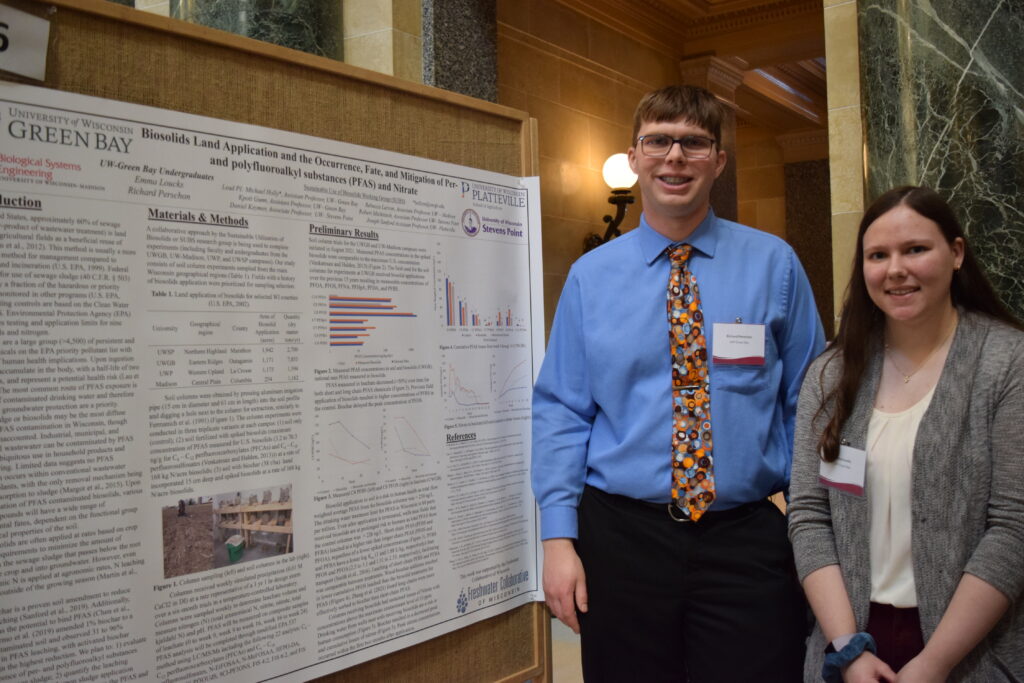
“The whole process really started when I got funds for a student to try things,” Holly says. “The funding helped me develop and home in on my methods and the materials I was using so I could be more competitive in applying for larger funding sources.”
In 2023, Holly and his colleagues Karen Stahlheber, Mandeep Bakshi, and Jessica Warwick received a $750,000 Capacity Building Grant from the U.S. Department of Agriculture, National Institute of Food and Agriculture (USDA). The research includes collaborators from Outagamie County, USGS, and UW-Platteville.
Their goal is to develop cost-effective solutions for removing phosphorus from agricultural runoff and reducing harmful algal blooms in the Great Lakes. The USDA grant will provide support for three graduate research assistantships, multiple undergraduate research assistants, and remote water quality monitoring equipment.
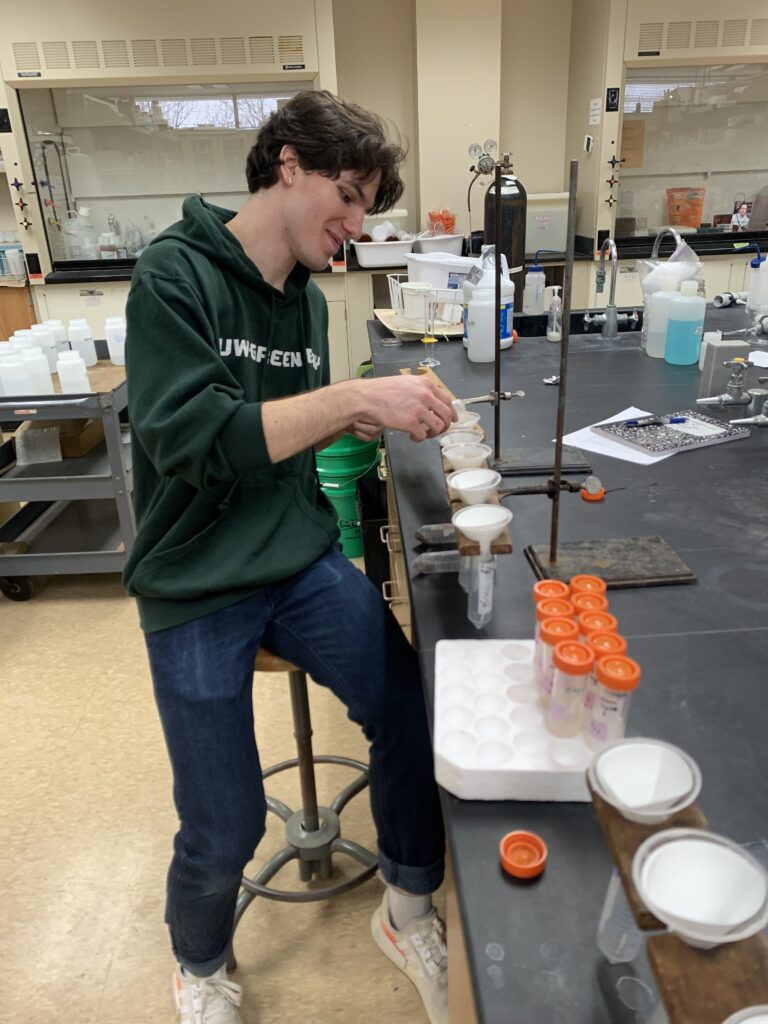
The investment will improve the agricultural runoff treatment system researchers use for testing filters, which is located on property owned by Heart of the Valley Metropolitan Sewerage District. Eventually they hope to work with farmers to deploy efficient and economical systems that will reduce agricultural nutrients running into water sources.
Just as exciting is that the researchers are converting various waste products into filter media to help create a circular economy. For example, they are testing steel waste from Charter Steel.
“We hope we can help local industries be more sustainable,” Holly says.
Great Lakes Freshwater Symposium April 24: Indigenous Sustainable Water Management
For its spring online Great Lakes Freshwater Symposium, the Freshwater Collaborative is partnering with the UW-Milwaukee Center for Water Policy to feature the research of Dr. Grace Bulltail and Research Associate Dr. Parisa Sarzaeim.
April 24, 11 a.m.-Noon (Central)
Register here!
They will be speaking on the availability and quality of publicly available tribal-led water-climate-environment (WCE) nexus databases on reservations and tribal lands in the U.S., showcasing the FAIRification process (Findability, Accessibility, Interoperability, and Reusability) of digital tribal WCE databases.
Bulltail is the 2023-2024 Water Policy Scholar at the Center for Water Policy and an Associate Professor at the University of Wisconsin – Madison’s Nelson Institute for Environmental Studies. Her research covers the disciplines of water resource engineering, natural resource management, land use, water quality science, and environmental justice in Indigenous communities. She focused her studies to tribal lands and federally reserved lands where water resources are governed by sovereign tribal nations.
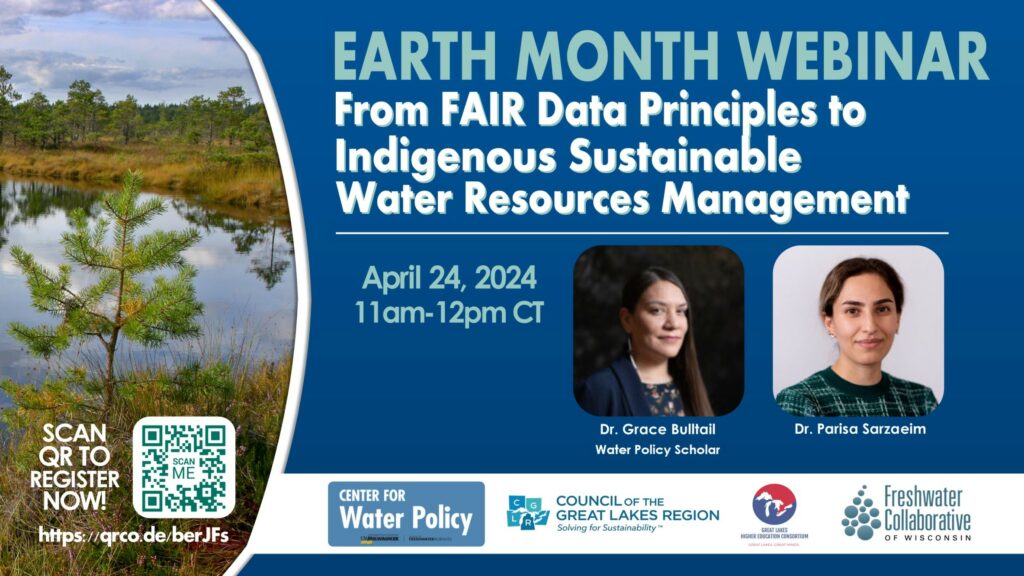
This event is part of a quarterly online water symposium series in partnership with the Great Lakes Higher Education Consortium and Council of the Great Lakes Region. These events seek to encourage and advance collaborations, share science across borders, encourage students in research and career opportunities and present research that is solving real-world problems.
Research in the Rotunda, March 6
Research in the Rotunda is a wonderful opportunity to learn about the exciting research going on throughout the state and to support Universities of Wisconsin students and faculty members who contribute to the state’s strong economic future. We are proud to showcase the research of 16 Freshwater Collaborative funded undergraduates at the 2024 event.
FRESHWATER COLLABORATIVE RESEARCH FELLOWS
1 Adsorption of PFAS in Nanoporous Solids
Anna Hahn, UW-Stevens Point, Stevens Point, WI
Jackson Mikel, UW-Stevens Point, Black River Falls, WI
Olivia Stellpflug, UW-Stevens Point, Omro, WI
2 Analyzing the Viability of Surface-Enhanced Raman Spectroscopy for the Accessible Detection of Toxic “Forever Chemicals” (PFAS) in Drinking Water
Andrew Glasgow, UW-Madison, Madison, WI
Co-author: Hanwei Wang
3 Coastal Bird Use of Small Stream Mouths Along the Western Lake Michigan Shoreline
Sarah Baughman, UW-Green Bay, Sheboygan, WI
4 Comparing the Effects of Restoration Age on Stream Ecosystems and Community Dynamics
Casie Kopischke, UW-Stout, Eagan, MN
5 Economic Impacts of Wisconsin Fishing Supported by the Freshwater Resources of Lake Michigan and Bay of Green Bay
Alaina Jacobs, UW-Whitewater, Sun Prairie, WI
Brooke Bauer, UW-Whitewater, New Berlin, WI
Clare O’Donnell, UW-Whitewater, Whitewater, WI
Madeline Murnion, UW-Green Bay, Green Bay, WI
6 Finding Relationships Between Length, Mass, Carbon, Nitrogen, and Protein in the Invasive Crustacean Hemimysis anomala
Noah Schrodt, UW-Madison, River Forest, IL
7 Lake Sturgeon Larval Production in the Upper Menominee River
Lauren Klawiter, UW-Green Bay, Seymour, WI
Co-authors: Steve Hughes, Zach Nordstrom
8 Overstimulation of the Innate Immune Response by the Neonicotinoid Pesticide Thiamethoxam: How Does This Contribute to Observed Toxicity in Fish?
Nicole Kooij, UW-La Crosse, Sun Prairie, WI
10 Sex-Based Spawning Behavior Differences in Lake Michigan Walleye
Carly Phalen, UW-Madison, Reedsburg, WI
11 Smart Farming and Precision Agriculture
Aidan Drew, UW-Stout, Lake Mills, WI
Josh Pederson, UW-Stout, Oronoco, MN
12 Sorption of Anionic Dye Alizarin Red S from Solution by Carbonate Mineral Dolomite
Anna Bowman, UW-Parkside, Libertyville, IL
13 Steamer NIAGARA: Her Demise, Her Artifacts, and Her Significance
Nick Quaney, UW-Milwaukee, Auburn, KS
14 The Cost of Clean Water: An Efficiency Analysis of Wisconsin’s Water Utilities
Arnish Gupta, UW-Whitewater, Frisco, TX
15 The Neonicotinoid Pesticide Imidacloprid Has the Potential to Influence Fish Populations by Interfering With the Immune Response
Allie Fowle, UW-La Crosse, Menomonee Falls, WI
16 Urban Stream Corridor Restoration Effects on Sediment Loading
Kal Breeden, UW-Stout, Lakeville, MN
For details and agenda, visit https://www.wisconsin.edu/research-in-the-rotunda/
CEU Field Course in Lake Michigan Coastal Systems Offered This Summer
The Human Interactions with Lake Michigan Coastal Ecosystems course is being offered to Wisconsin residents for 15 Continuing Education Units. This Freshwater Collaborative course was developed and is taught by faculty from UW-Milwaukee, UW-Green Bay and UW-Parkside.
Participants will explore habitats from Green Bay, Peshtigo, Manitowoc and Sheboygan to the more urban areas of Milwaukee, Racine and Kenosha, learning basic sampling techniques and technologies to study the human impacts on the coastal ecosystem.
Individuals interested in this course for 15 CEUs must apply by March 31 and will be notified of their permission to enroll by April 15. Spaces are limited. CEU students must enroll as a guest student upon acceptance to the course and register with the “credit/no-credit” grading option. No prerequisites.
Apply at uwm.edu/freshwater/coastal
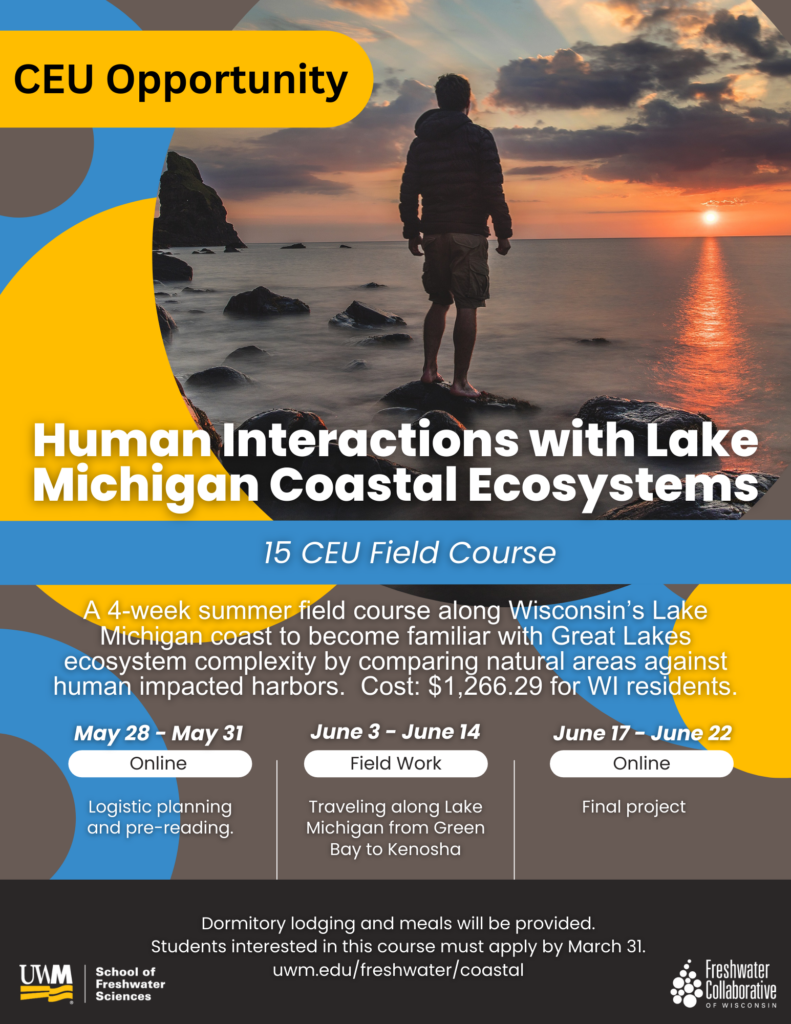
UW-River Falls Institute Helps Students Hit the Ground Running
For UW-Stout senior El Bartho, interning at the UW-River Falls Ecological Restoration Institute (ERI) was the perfect way to determine what she wants to do after graduation.
The Environmental Science major, who is double minoring in Geographic Information Systems (GIS) and studio art, interned as a conservation technician in summer 2023, working on a pilot project with the U.S. Fish and Wildlife Service (USFWS) St. Croix Wetland Management District.
“I really wanted to learn the restoration and preservation tactics implemented by real-life organizations, and this internship allowed me to see the techniques used on a local level and on a federal level,” Bartho says.
The ERI is a donor-funded initiative established in 2020 to provide high impact experiences for UW-River Falls students going into conservation and environmental science. The ERI offers work experience and internships to undergraduates as well as certifications in chainsaw safety, aquatic and mosquito pesticide application, ATV and boat safety trainings with the WDNR, NOLS-accredited wilderness first response training, and wildfire fighter training. In 2023, 78 UW-River Falls students enrolled in one of the training/certification courses.
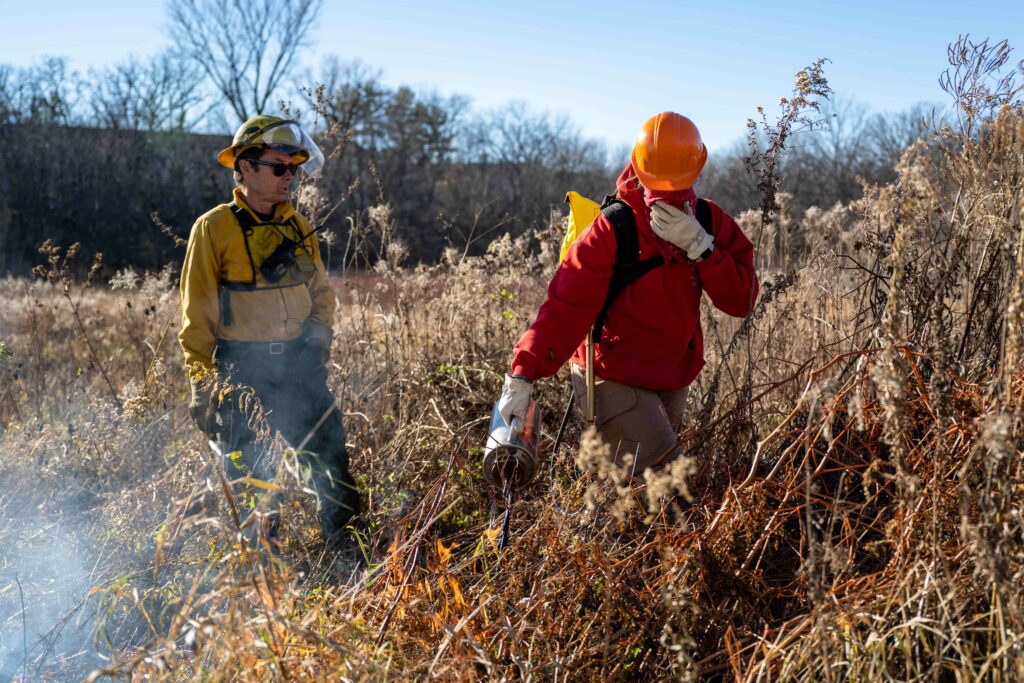
“The idea is to give students boots-on-the-ground experiences that translate to career skills that allow them to be productive contributors right out of the gate, which is really exciting,” says Holly Dolliver, professor of geology and soil science at UW-River Falls.
Dolliver hopes that in the future, with additional funding, the ERI would be able to offer certifications to students from other UW campuses and the broader community.
“We are exploring the possibility to extend our certifications and trainings to the community,” she says. “We’re in a very conservation-centric area of Wisconsin. There’s a lot of interest and a lot of need. We are well-positioned to be a center of excellence in conservation education and training.”
Dolliver says the Freshwater Collaborative grant also allowed UW-River Falls to expand the joint internships with USFWS. Bartho was the first intern hired from another campus, and she found it beneficial to share ideas and perspectives she gained at UW-Stout from faculty and students from UW-River Falls.
“I found it incredibly interesting to see how UW-River Falls incorporates their on-campus resources into their curriculum,” she says. “I was able to combine the knowledge I gained from my time at UW-Stout with my newly acquired knowledge from UW-River Falls and USFWS.”
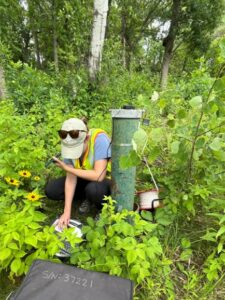
She and her coworkers spent four days a week working at USFWS Waterfowl Production Area (WPA) sites — small federally protected areas of land that provide recreational activities and habitat — and one day a week on the UW-River Falls campus where they implemented what they learned on campus restoration projects that include forest systems and a floodplain managed as a wet prairie of the South Fork River System.
The interns also received Wisconsin Water Action Volunteer training to be able to determine the water health of Wisconsin streams and became herbicide applicator licensed in the state of Wisconsin. One of the things Bartho enjoyed most was the range of locations and experiences, including duck banding with the Wisconsin DNR, picking and planting seeds, water sampling with hydrologists, vegetation surveys, bird surveys, aquatic invasives monitoring, and nature and bird walks.
She also appreciated how her supervisors took time to partner her with federal and state hydrologists and encouraged her to explore her interest in GIS. Those experiences helped her determine she would like to pursue a career in bathymetry, the study of the underwater beds of water bodies that will allow her to combine multiple interests.
“I wanted an internship that allowed me to explore the possibilities that a career in my major could entail and that’s what I got!” she says. “I’d like to extend my gratitude to the UWRF Ecological Restoration Institute, the Freshwater Collaborative, and the USFWS St. Croix Wetland Management District for all their planning and organization that went into this program that allowed me to have this internship.”
Visit www.uwrf.edu/PES/ERI.cfm to learn more about the certifications and trainings offered by the Ecological Restoration Institute.
Recording from Groundwater Policy Developments Symposium, Feb. 13, 2024
The Freshwater Collaborative of Wisconsin hosted the Great Lakes Freshwater Symposium: Groundwater Policy Developments. Panelists discussed groundwater policy developments and challenges in their states, and what kind of research is needed related to factors such as managing agricultural contaminants and PFAS.
Panelists included:
- Rachel Burns, Environmental Quality Specialist, Michigan Department of Environment, Great Lakes, and Energy
- Steven B. Elmore, Program Director, Bureau of Drinking Water and Groundwater, Wisconsin Department of Natural Resources
- Steven B. Elmore, Program Director, Bureau of Drinking Water and Groundwater, Wisconsin Department of Natural Resources
This event was part of a quarterly online water symposium series in partnership with the Great Lakes Higher Education Consortium and Council of the Great Lakes Region. These events seek to encourage and advance collaborations, share science across borders, encourage students in research and career opportunities and present research that is solving real-world problems.

